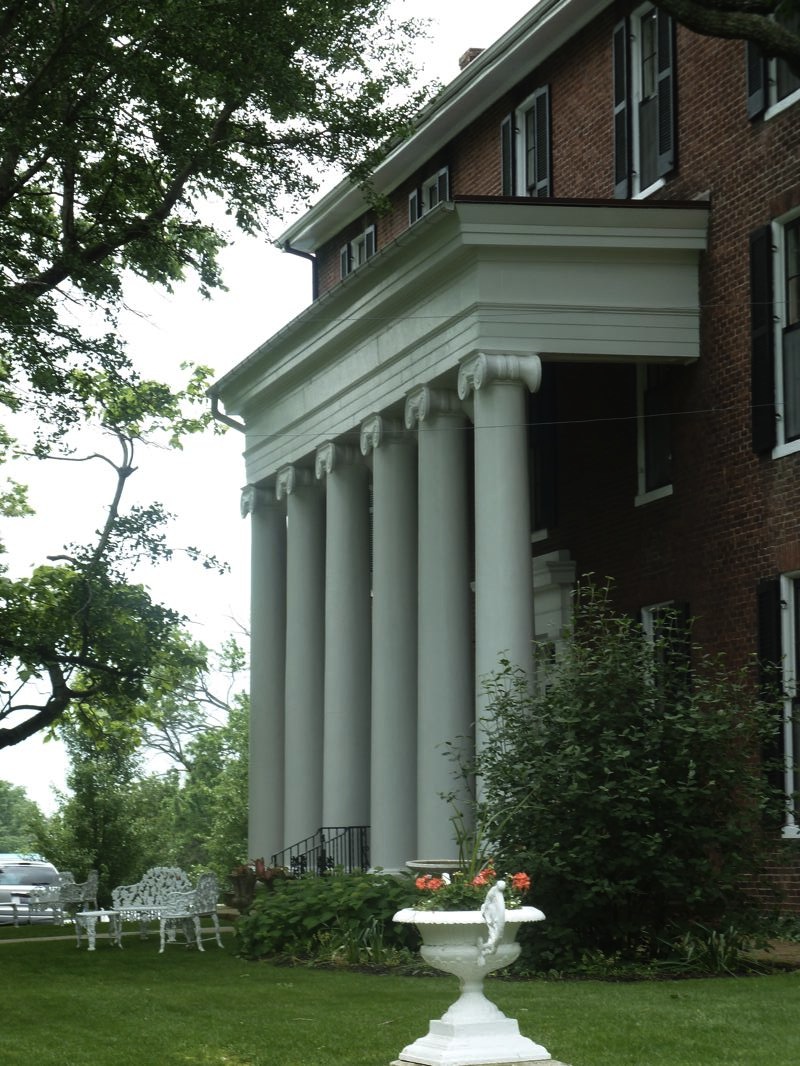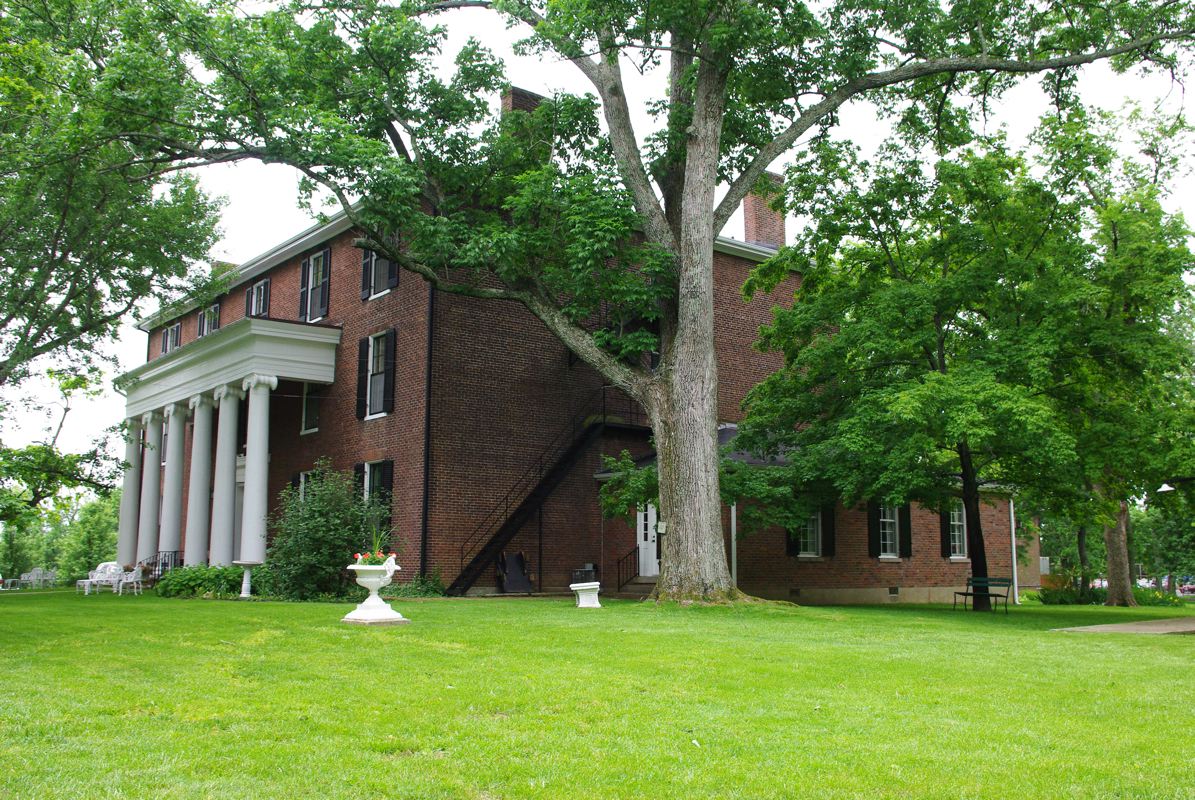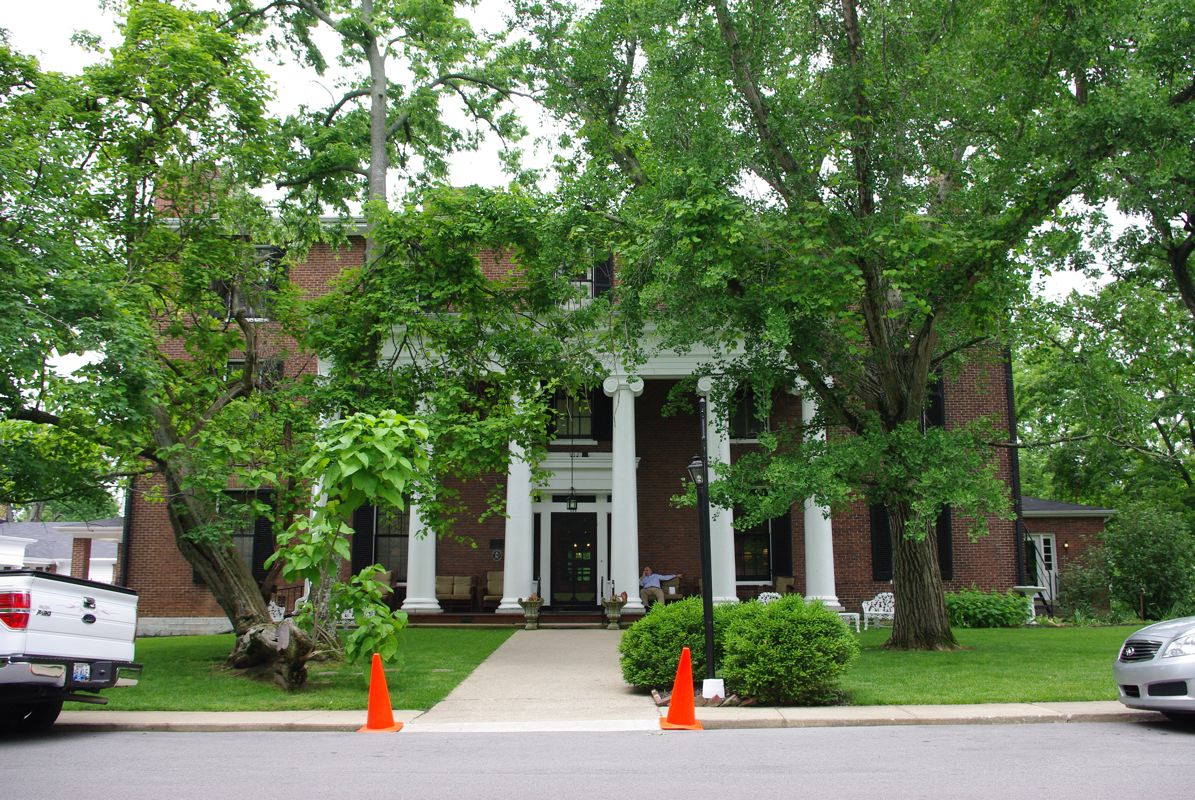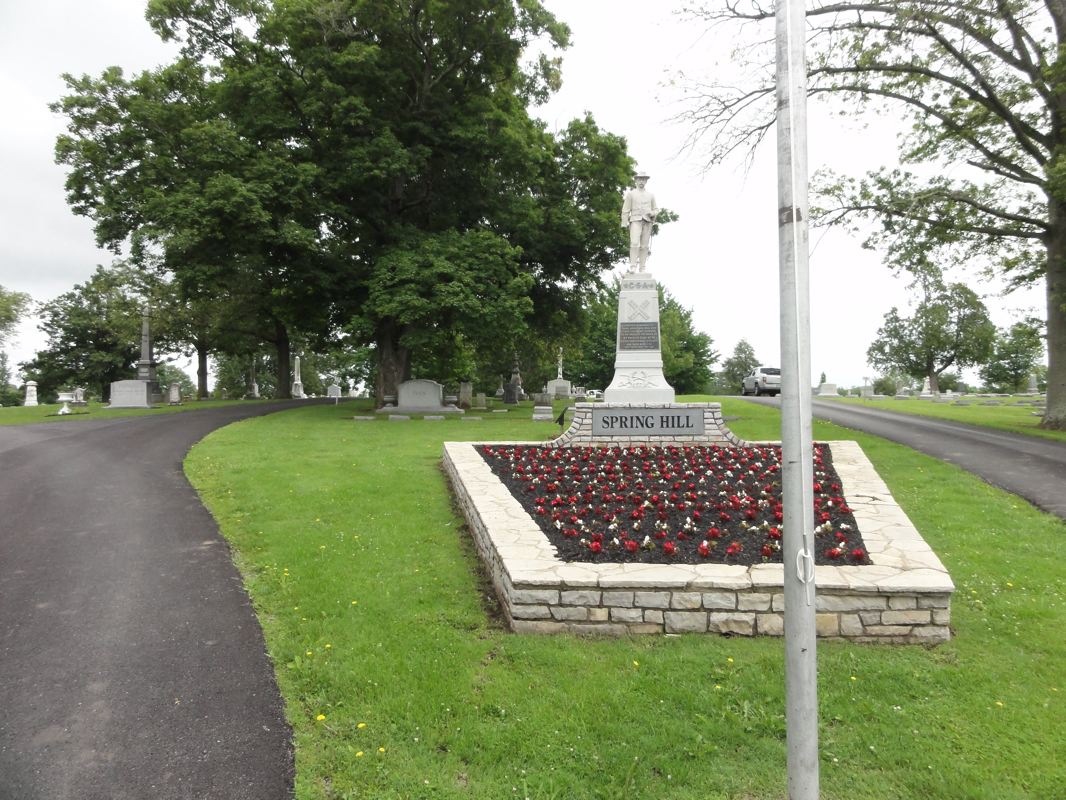John Augustus Williams
1824-1903
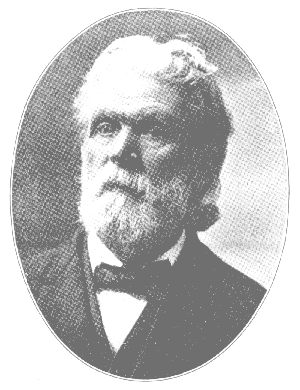
![]()
John Augustus Williams
He was born in Bourbon county, Kentucky, September 25, 1824. He is a descendant of Roger Williams, of Rhode Island, but blending with his wild blood thus derived, he is rich also in Irish and French blood, through his grandmothers, Mills and Littrelee. He received his earlier education in the excellent schools of Paris, and his regular degrees of A.B. and A. M. from Bacon College—now Kentucky University—under the presidency first, of Dr. David S. Burnet, and then, of Dr. James Shannon. Afterwards the honorary degree of LL. D. was conferred upon him by the Masonic University, then in successful operation at LaGrange, Kentucky.
He read law in Paris for the most time in the office of Hon. Garrett Davis, and with the view of practicing in the Montgomery courts, in association with Mr. Davis, he removed to Mount Sterling in 1846.
But strongly urged to teach, by numerous friends in that county, he finally accepted, in 1848, the principalship of Prospect Hill Seminary, a boarding school, for both ladies and gentlemen. In that year, also, he wedded Miss Mary Hathaway, of Mount Sterling, Elder John Smith officiating; and the young but gifted bride was at once installed as matron in what soon became a large and prosperous institution.
 By the urgent solicitation of citizens in Bourbon county, he was persuaded to establish, at North Middleton, in that county, two distinct, but associated institutions. One known as "Bourbon Institute," for young ladies, the other, as "Clay Seminary," for young gentlemen, located in opposite parts of the village. Aided by his wife, and several competent assistants, he presided over these separate institutions with such ability that they were soon filled to the utmost capacity of the buildings.
By the urgent solicitation of citizens in Bourbon county, he was persuaded to establish, at North Middleton, in that county, two distinct, but associated institutions. One known as "Bourbon Institute," for young ladies, the other, as "Clay Seminary," for young gentlemen, located in opposite parts of the village. Aided by his wife, and several competent assistants, he presided over these separate institutions with such ability that they were soon filled to the utmost capacity of the buildings.
In 1851, he was offered a liberal bonus if he would remove to Columbia, Mo., and establish a college of high order for women.
The field was inviting, and with the full concurrence of his wife, without whose approval he never would undertake an enterprise, he removed to Missouri, and established Christian College, still the most prosperous female college in the West.
In 1856, his health began to decline, and his wife consenting, he resigned the presidency of Christian College, returned to Kentucky, and purchased the beautiful suburb near Harrodsburg, known as Greenville Springs, and established, in connection with his father, Dr. C. E. Williams, the famous Daughters College which they conducted with great success for nearly forty years.
During that period, however, he was elected president of the State College, at Lexington; served two years and was then chosen president of Kentucky University. But his wife preferring to return to her beautiful home near Harrodsburg, he declined to accept the latter office, resigned the former, and once more gave his undivided energies to his beloved school for ladies, which, however, was never suspended a single day during his two or three years absence.
But in 1892, his long and arduous labors, with his advanced age, began seriously to impair his health, and he was compelled to bring his work as a teacher to a final close. His aged father had passed away. Large security debts oppressed him, and at last he gave up his fine estate to his creditors, and retired with his wife, sick and penniless, to a cosy cottage in Harrodsburg, presented to him by his grateful and noble hearted pupils.
Rest, which he so much needed, soon recruited his health, but in idleness he grew restless. The Grand Lodge of Masons, meeting in Louisville, appointed him Grand Lecturer for the state. He accepted the office for two years, and traveled over many counties, lecturing in the principal towns and villages; and then once more settled down in his pleasant cottage home, happy in the companionship of his ever cheerful and devoted wife.
His travels over, he gave the hours of his retirement to writing for the press, and finally to authorship. He had already published the "Life of John Smith," and now, in quick succession, there came from his busy pen, "Rosa Emerson," "Reminiscences," "Thornton," and "Priscilla, or a Christian Wife's Method with a Skeptical Husband," the last, however, still in MSS. awaiting publication.
In June 1902, his wife passed to her great reward, being preceded by five of her children—all in fact, save one—Augustus E., the comfort and stay of his declining days. He has never recovered from the shock and gloom of his wife's departure, with whom he had lived in blissful union for fifty-four years.
Churches of Christ, ed. John T. Brown, c. 1904, pages 446,447 = Note: This sketch was written in present tense, though Williams had died by the time this volume went to press.
![]()
Biographical Sketch of John Augustus Williams, A. M., L. L. D.
JOHN AUGUSTUS WILLIAMS, A. M., LL.D., President of Daughters College, Harrodsburg, Ky., was born September 21, 1824, in Bourbon County, Ky. His father was Dr. Charles Edwin Williams, a native of Montgomery County, Ky., a physician of high standing, a man of scholarly attainments, who for many years was associated with his son in the management of the affairs of Daughters College, and who finally passed away in 1881 to the enjoyment of still higher scenes and associations. The mother of Prof. Williams was Arabella Dodge, daughter of one of the early merchants and manufacturers of Lexington, Ky. The Williams family is of Welsh extraction.
Raleigh Williams, grandfather of Prof. Williams, immigrated to Kentucky from Virginia with the early settlers of the former state. Prof. Williams passed the opening years of his life at Paris, Bourbon County, where his earliest instruction was received, and at the age of fifteen, entered Bacon College, then located at Georgetown, Ky., as a student. While in attendance at that institution it was removed to Harrodsburg and subsequently became known as the Kentucky University, from which our subject graduated in 1843, under the presidency of Dr. James Shannon. He subsequently received the degree of A. M. from his alma mater, and later, that of LL.D., from the Masonic University at LaGrange, Ky. After leaving college he entered on the study of law with a view of adopting that profession, but was prevented from accomplishing that purpose by the development of a very decided taste for teaching and the discovery of serious needs in the educational system of the State. In 1848 he took charge of what was called Prospect Hill Seminary, a boarding school for young ladies and gentlemen near Mt. Sterling, an institution which became very prosperous under his management, and in which he obtained considerable distinction from his original methods and superior talents as a teacher. He soon after established a female college at North Middleton, in Bourbon County, known as Bourbon Institute, in which he aimed to carry into full effect his advanced plans of education.
In 1851 he was urged to and did establish his institution at Columbia, Mo., the seat of Missouri University. A liberal charter was granted by the State and under the designation of Christian College it was formally organized in the spring of that year. His conduct of the school brought it into popular notice and universal popularity, filling it to overflowing, with young ladies of the best families in the State. He presided over that institution until 1856, when ill health and a desire to return and labor in his native State, induced him to resign. In that year he purchased, in connection with his father, the property at Harrodsburg, upon which is situated the celebrated Greenville Magnesian Springs, and established the Daughters College, now one of the most successful institutions of its kind in the State. The name was given to the school to express the two fundamental ideas of its educational system that it was both a school that should be collegiate in its domestic wants of girls away from their parents. The success that attended the opening of the school in 1856 has been almost uninterrupted to the present, a period of nearly thirty-one years. The war of the States cut off for a while some of its most distant patronage; but pupils continued to come even during that period, sometimes with military passes in their hands. Not a day was lost during the four years of strife, though the sound of distant artillery sometimes mingled with the voices of the faithful teachers in the class rooms.
In 1865 President Williams was appointed to the chair of moral and mental philosophy in Kentucky University, and afterward to the presidency of the former positions he accepted and filled, but declined the latter; yet during his temporary absence Daughters College, though limited in the number of its students, continued to prosper under the skillful management of able assistants. In 1865 Prof. Williams resigned his position in the university at Lexington and returned to his beloved pupils at Harrodsburg. Soon its halls were filled. Students again flocked in from Kentucky and the surrounding States. Since that time it has gone on quietly in its career of usefulness; and, without any special effort to obtain patronage, it has always been full. It now has 150 students enrolled, representing fifteen States. It is assumed, in the system of education at this college, that every student is to become a teacher and trainer of youth, either in the capacity of mother, or in that of a professional teacher. The effect of this policy is to give to the school a decidedly normal character, evinced by the fact that so large a number of good teachers are annually graduated therefrom. From time to time, departures from the usual routine and customs of schools have been made as the experience of the faculty suggested. It has consequently been recognized as the pioneer in many of the reforms that now characterize our best female schools. The abolition of the rote methods of study and recitation, and the discontinuance of all public parades, rostrum performances and exhibitions of young lady students, were early insisted on; and papers adverse to these and other customs have been kept for years before the people in the annual catalogues of the college. Public sentiment, especially in Kentucky, has at last begun to array itself against many of these things; and other institutions are beginning to modify or to discontinue them altogether.
The life of Dr. John Augustus Williams has been a busy one, yet the wear and tear that attend the ofttimes routine labor of a popular educator, has made no strong impression upon his physical resources. He is still well preserved, ardently in love with his responsible and high calling, and actively engaged in solving the great problem of higher education in Kentucky. He was one of the original movers in the organization of the State Teachers’ Association, has contributed extensively to various literary and religious periodicals, and delivered many addresses. His life of “Elder John Smith” is a well-known and standard volume. His most important work, however, will be the one on “Christian Ethics,” now in course of preparation. He has also occasionally been induced to occupy the pulpit of various churches, both in and out of his own denomination. He is a man of fine tastes, has a great fondness for poetry, literature and art; of genial and attractive presence, kindly nature and greatly esteemed and respected by his associates and pupils, as well as by the community at large. He was married in 1848 to Miss Mary L. Hathaway, daughter of Philip Hathaway of Montgomery County, Ky., a representative of one of the early pioneer families from Virginia, and a lady of great excellence of heart and mind. Three sons born of the union are now living, viz: Augustus Edwin Williams, Professor of Music in the College; Bowman Guy Williams, book-keeper in same, and Lee Price Williams, a young student of medicine.
Only a few years after the preceding biography was published, President Williams, because of financial troubles and failing health, stepped down and out, and the College passed into other hands. This Christian gentleman of brilliant mind and understanding heart, has long since passed to his reward, but still lives in the hearts of his girls, who thank God it was their blessed privilege to receive from him and his faithful helpers an education, unique in its simplicity, unsurpassed in its Christian training, and unexcelled in its type of womanhood.
The only survivors of this lovely family are two grandsons, James Price and Edwin Augustus, sons of Augustus E. Williams; two great grandsons, Andrew Devine Williams, son of James Price Williams, and Edwin Miller, son of Edwin Augustus Williams.
President Williams died in November 1903. His wife and Price preceded him to the grave. His elder son, Augustus E. Williams died in 1916. Another son, Bowman Williams, died in 1898.
We are pleased to add an appendix to the biography of President Williams, of information given by Mr. Edgar C. Riley, President of the Midway Orphan School: “After making his confession of faith in 1838 when he was fourteen years of age, Mr. Williams was baptized by Aylette Raines in Stoner Creek, after the ice, then six inches thick, had been cut away.
In 1837 he was a student at Georgetown at Bacon College; from 1846 to 1849 he lived at Mt. Sterling; from 1849 to 1851, taught at the Bourbon Institution for girls at North Middletown, and at the Clay Seminary for boys. From 1851 to 1856, he was President of Christian College at Columbia Missouri; from 1856 to 1893, President of Daughters College at Harrodsburg, but during two years of this time he was at the State College (now Transylvania in Lexington) teaching English. During two years he was President of the Agricultural College in Lexington, Ky., he brought with him his senior class of eight girls from Daughters College. These girls stayed that year with a Mr. Hocker. After teaching at the University during the day-time, he taught these girls at night. This was the origin of Hocker, later Hamilton College. Mr. John P. Sparks once told me that he had a class under Mr. Williams at the University, and that the latter told his boys, the last year he was there, that he was and should be a teacher of girls. Next year he went back to Harrodsburg.”
- (Page 770 History of Kentucky by W. H. Perrin, J. H, Battle and G. C. Kniffin. Published 1887, by F. A. Batty & Co., Louisville, Ky.) as published in Daughters College, Harrodsburg, Ky 1856-1893, And Its Founder, John Augustus Williams, A. M., L L. D. 1824-1903, pages 15-17.
![]()
Obituary For John A. Williams
It was with deep sorrow and regret that the friends of Mrs. John Aug. Williams learned of her death, which occurred Tuesday morning at 1 o’clock, after an illness of two weeks. The physicians had had no hope of her recovery for several days and the family and friends watched by the bedside expecting the end each moment for forty-eight hours. Death came peacefully, and quietly closed the life of one of the noblest characters and most lovable women that ever lived in this community. Mrs. Mary Hathaway Williams was born in Montgomery County, near Mt. Sterling about 77 years ago. It was while at law and teaching in that county that President Williams met her, and 54 years ago their ideal married life began. During most of that time they resided here and many have learned to love and bless her for her tender sympathy with suffering and her lovable traits of character. In every sense of the word she has been a helpmate and comfort to the man with whom her life was linked, and who still survives her, and toward whom the sincerest sympathy and sorrow of the whole community is extended. Six children blessed their union, three sons and three daughters; of these only one son is left to comfort the father, Mr. Aug. E. Williams. The funeral services will be conducted at 3 p.m. today at the residence, by Rev. M. G. Buckner, pastor of the Christian church, assisted by the other ministers in town, of which church Mrs. Williams had been a faithful and devoted member. Her life has been a beautiful lesson of love, devotion and self-sacrifice to her family and friends, and a record of sweet cheerfulness and contentment through sunshine and shadow.
(Harrodsburg Herald, Harrodsburg, KY, Thu Jun 12, 1902)
WILLIAMS
President John Augustus Williams Goes to His Reward
Sunday morning a shadow was thrown over the whole community by the announcement of the death of President John Augustus Williams. The end came unexpectedly, in the night-just the quiet dropping away into that peaceful sleep that He giveth His beloved. Since the death of his wife, a little over a year age, he had been waiting with Christian patience the summons that met the renewal of that companionship so dear to him on earth, and when the call came he answered it with never a murmur or regret for the things left behind. A few days before the end he said to a friend: “I am thinking of the past and the distant future, very little of the present. Of the past in which I watched the unfolding characters of my school girls, and the future when I will see so many of them who are waiting, with my wife, for me.” With the breaking of those loved ties, he seemed to have loosed his hold on earthly things, and drifted more and more into a dream life, full of memories, failing uncomplainingly as the days went by until Saturday, when he did not leave his room. He refused to see a physician, saying he was not ill and in no pain, but that night at eleven o’clock he fell into unconsciousness, from which he slipped quietly and painlessly into the arms of Death. The funeral services were held at his late residence and were very short and simple, in accordance with his wish. They were conducted by Dr. M. Gano Buckner, pastor of the Christian church, in which President Williams had been a minister since early manhood, and Dr. J. G. Hunter; of the First Presbyterian church, a warm personal friend. A touching feature of them was the sincere and heartfelt tribute paid him by Mr. C. H. Dutcher, of Warrenburg, Mo. In a few simple and direct words, with the tears streaming down his cheeks, he told of how the man, now lying there unresponsive, had befriended him when he was a poor and needy student at old Bacon College here. How he had learned from him the unselfish and honorable principles of life; how every good impulse and unselfish action with which he was credited, could be traced back to the friendship and influence of President Williams. In broken words he told how he had planned to visit him in October, to hold once more in his hand the hand of the man to whom his heart went out in gratitude for benefits unforgotten, and how his son had asked that his visit be postponed until he could accompany him, and when Sunday morning, November 8th, the telegram announcing his death was handed to him, he immediately hastened here to mingle his tears with those who loved him, and all he could do now was to bear this simple testimony of the good that would live after him. His words found an echo in the hearts of the whole community, for President Williams’ life had always stood for all that was charitable and unselfish.
He was educated here at old Bacon College, and afterward moved to this place in August 1856, where, in conjunction with his father, he purchased of Mr. George Mullens the school known as Greenville Institute, and which later, under the presidency of Mr. John Augustus Williams, gained a national reputation as Daughters’ College, and whose graduates and pupils are numbered among the finest types of womanhood in the land. In 1893 the school was sold to a corporation, and afterward bought by Col. Th. Smith, of Brownsville, Tenn., who changed the name to Beaumont College. After giving up his educational work, President Williams was appointed Grand Lecturer of the Masonic Lodge, which position he held two years when his health became too feeble for the strenuous life. He had always been a profound thinker and a writer of some note, and his later years were given up entirely to literature. The books of which he is the author are “The Life of Elder John Smith,” “Rosa Emerson,” and its sequel 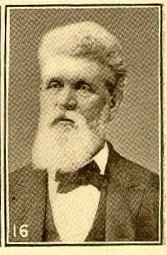 “Thornton,” “Reminiscences” and “Priscilla,” which is still in manuscript form, but ready for publication. He also assisted materially in Anderson’s translation of the New Testament. He was married February 15, 1845, to Miss Mary Louisa Hathaway, of Montgomery County. Of this union six children were born, three girls who died in childhood and Messrs. Augustus E. Bowman and Price Williams. Mr. A. E. Williams is now the only surviving member of the family. Of the other immediate relation but two sisters remain, Mrs. Mary D. Bowman, and Mrs. Belle Buckner, who had been making their home with President Williams for several years. He was a man venerated and admired for his many noble gifts and talents, not only among the people whom his daily life was spent, but throughout the state. A magnificent oil portrait of him has been hung in Morrison Chapel, Kentucky University.
“Thornton,” “Reminiscences” and “Priscilla,” which is still in manuscript form, but ready for publication. He also assisted materially in Anderson’s translation of the New Testament. He was married February 15, 1845, to Miss Mary Louisa Hathaway, of Montgomery County. Of this union six children were born, three girls who died in childhood and Messrs. Augustus E. Bowman and Price Williams. Mr. A. E. Williams is now the only surviving member of the family. Of the other immediate relation but two sisters remain, Mrs. Mary D. Bowman, and Mrs. Belle Buckner, who had been making their home with President Williams for several years. He was a man venerated and admired for his many noble gifts and talents, not only among the people whom his daily life was spent, but throughout the state. A magnificent oil portrait of him has been hung in Morrison Chapel, Kentucky University.
After the services at the house the remains were taken charge of by the Masonic lodge and he was buried with all the honors of that order, of which he had been a member for over fifty years. Ryan Commandery, No.17, of Danville, of which he was an honorary member, was present and performed the last rites for the dead. Afterward all the pupils of old Daughters College, who were present, and those of Beaumont, who attended in a body, dropped an ivy leaf in the grave for the sake of memory. President John Augustus Williams was born September 5, 1824, at North Middletown, Bourbon county, Ky. His parents were Charles Edwin Williams and Arabella Dodge.
(Harrodsburg Herald, Harrodsburg, KY, Thu Nov 12, 1903)
![]()
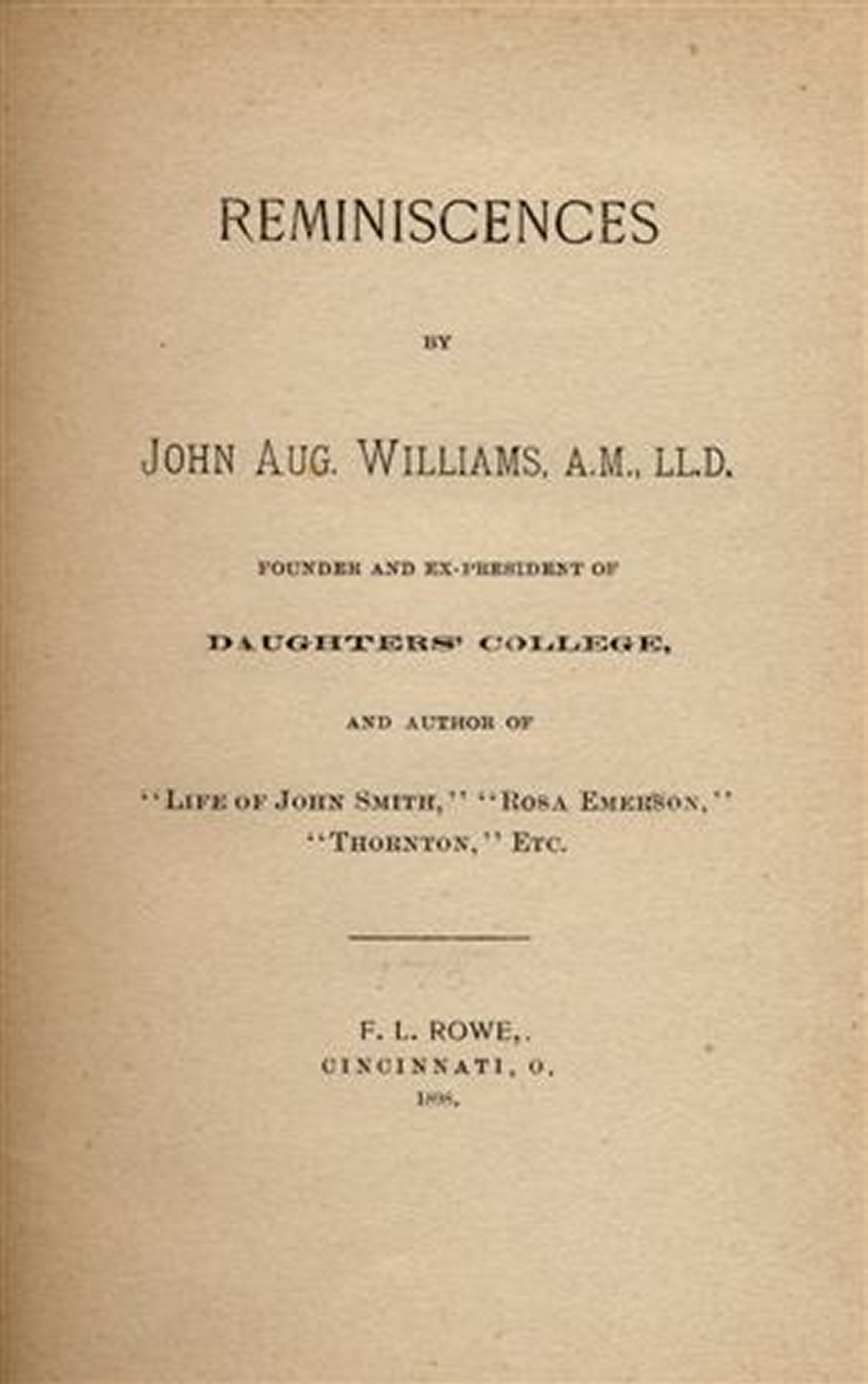
Frontispiece
Reminiscences
by John Aug. Williams AM LLD
Founder and Ex-President of
Daughters' College
And Author of
"Life of John Smith, "Rosa Emerson,"
"Thornton," etc.
F.L. Rowe
Cincinnati, O.
1898
![]()
Directions To The Harrodsburg Home Of John A. Williams, Now The Beaumont Inn
The town of Harrodsburg lies about 30 miles SE of Lexington, Kentucky. Hwy. 68 out of Lexington is called the Harrodsburg Rd. The first fifteen or so miles are pretty straight, but the last few will be somewhat tedious, with many twists and curves. On this road will be the Shaker Village, that is something most interested to see if you have time. However if you are intending to find the Beaumont Inn, and former home and college of John A. Williams, you will continue into town. Coming into the middle of town turn left on S. Greenville St. Go down to Beaumont Ave, and turn left. Go until you turn right on Beaumont Inn Dr. The Beaumont Inn will be on the right. While there, be sure to visit the old home of Dr. James Shannon.
GPS Location
37.752601,-84.842506
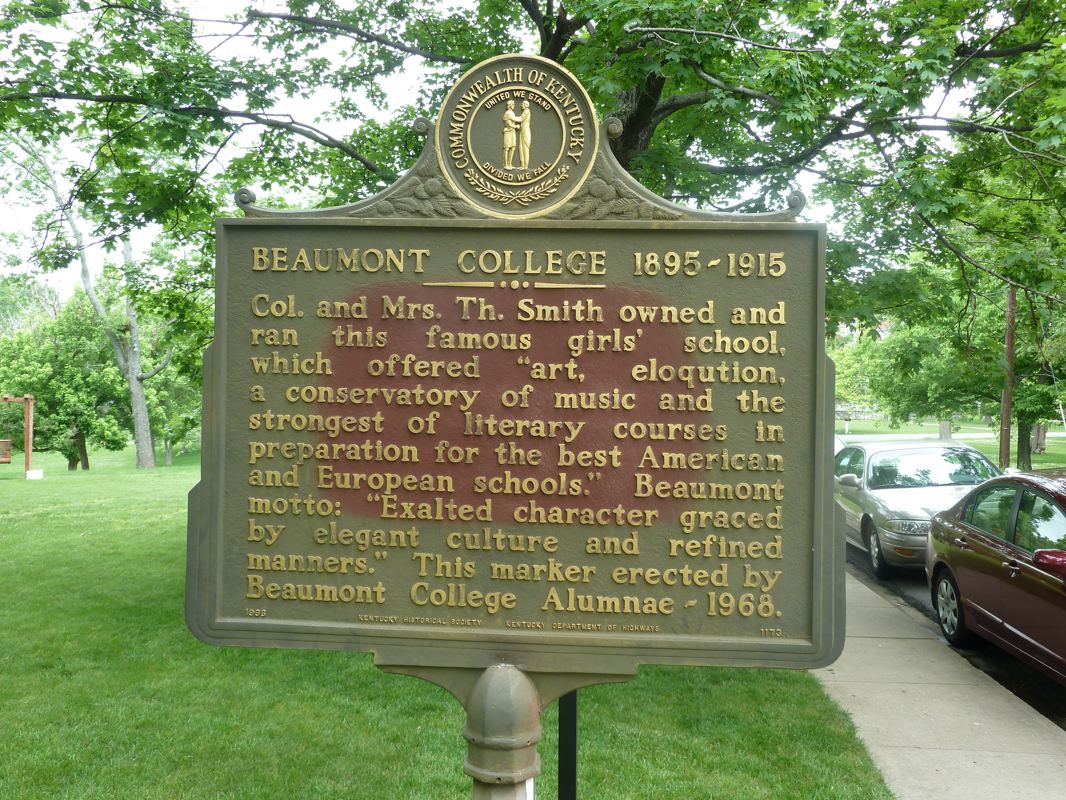
Beamont College 1895-1915
Col. and Mrs. Th. Smith owned and
ran this famous girls' school,
which offered "art, elocution,
a conservatory of music and the
strongest of literary courses in
preparation for the best American
and European schools." Beaumont
motto: "Exalted character and refined
manners." This marker erected by
Beaumont College Alumnae - 1968.
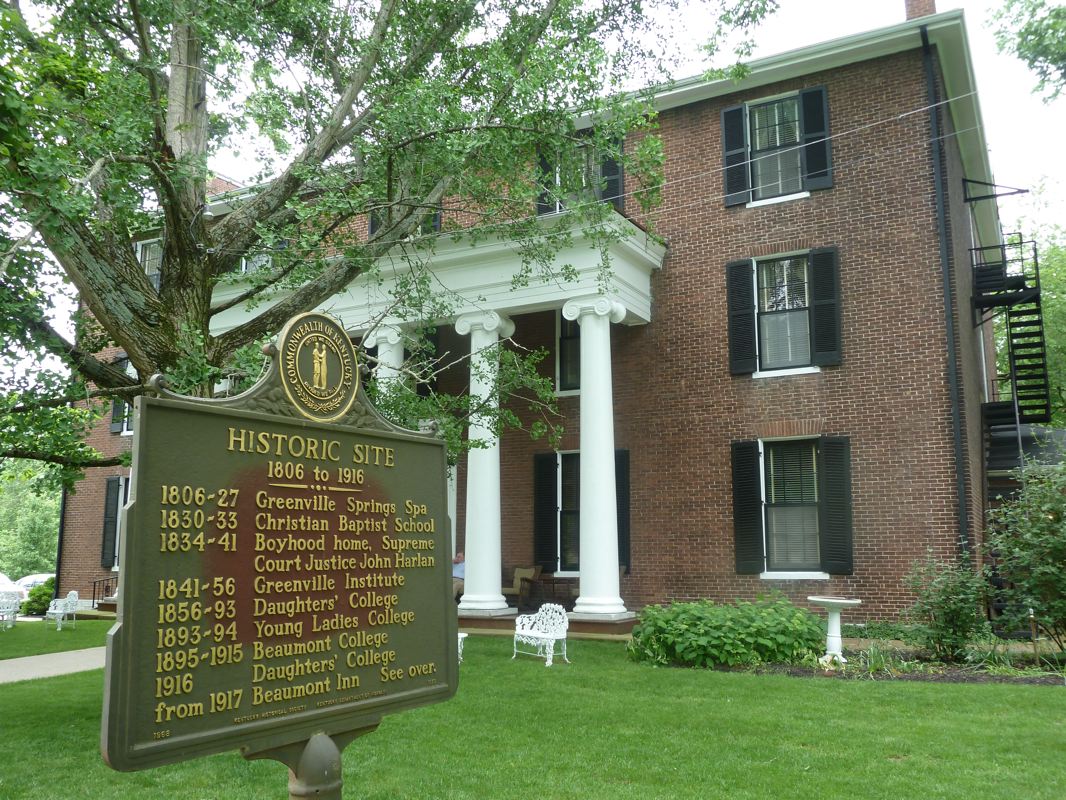
Historic Site
1806 to 1916
1806-27 Greeville Springs Spa
1830-33 Christian Baptist School
1834-41 Boyhood home, Supreme
Courth Justice John Harlan
1841-56 Greenville Institute
1856-93 Daughters' College
1893-94 Young Ladies College
1895-1915 Beaumont College
1916 Daughters' College
from 1917 Beaumont Inn
![]()
Directions To The Grave of John A. Williams
The town of Harrodsburg lies about 30 miles SE of Lexington, Kentucky. Hwy. 68 out of Lexington is called the Harrodsburg Rd. The first fifteen or so miles are pretty straight, but the last few will be somewhat tedious, with many twists and curves. On this road will be the Shaker Village, that is something most interested to see if you have time. However if you are intending to find the Beaumont Inn, and former home and college of John A. Williams, you will continue into town. Coming into the middle of town turn right on N. Greenville St. Go a few blocks and you will see the Spring Hill Cemetery on the right. Head into the cemetery past the CSA monument into the first section you come to behind it. The Williams plot will be in the Center of section CIR.
GPS Location
37.768054,-84.840725
![]()
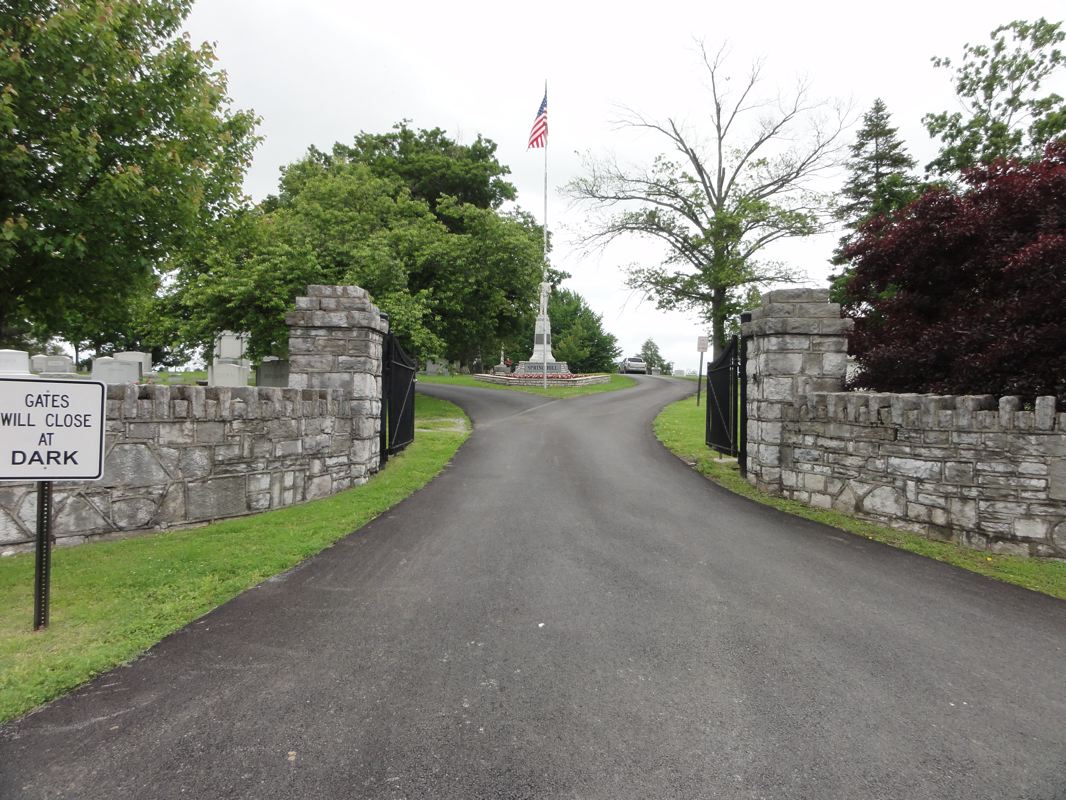
Entrance To Harrodsburg's Spring Hill Cemetery
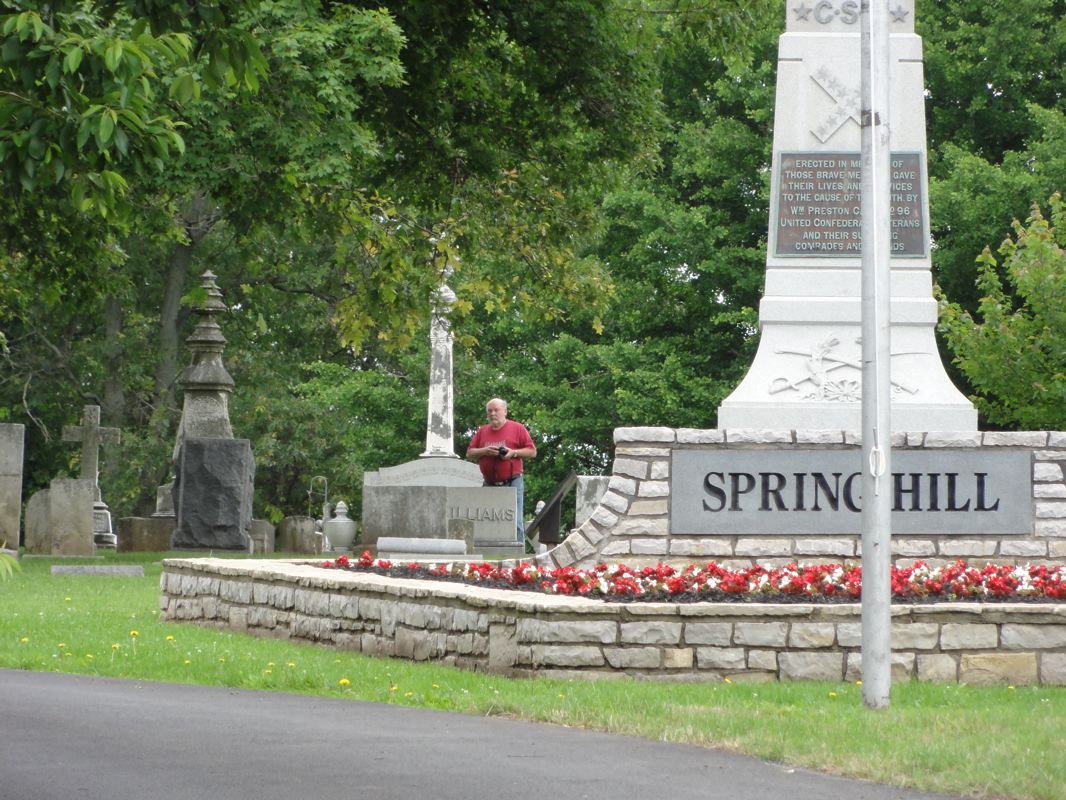
C. Wayne Kilpatrick at the grave of John Augustus Williams
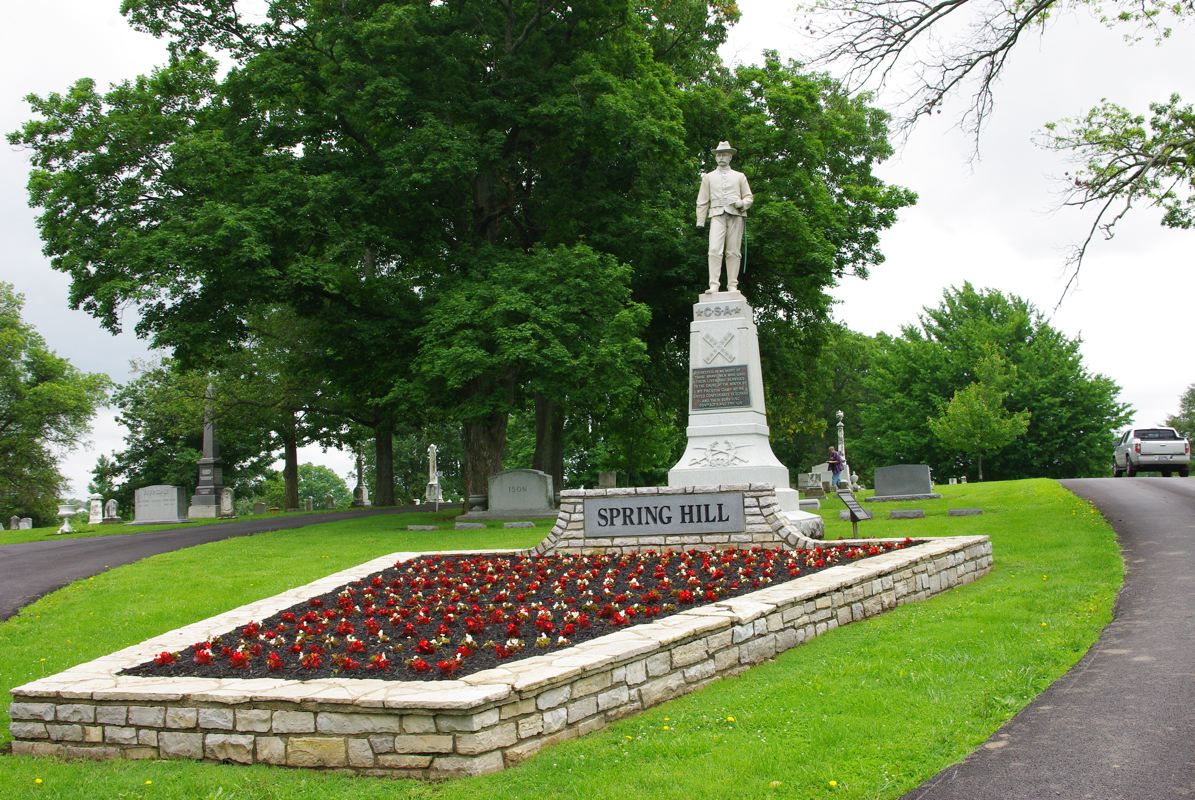
Confederate States of America War Memorial
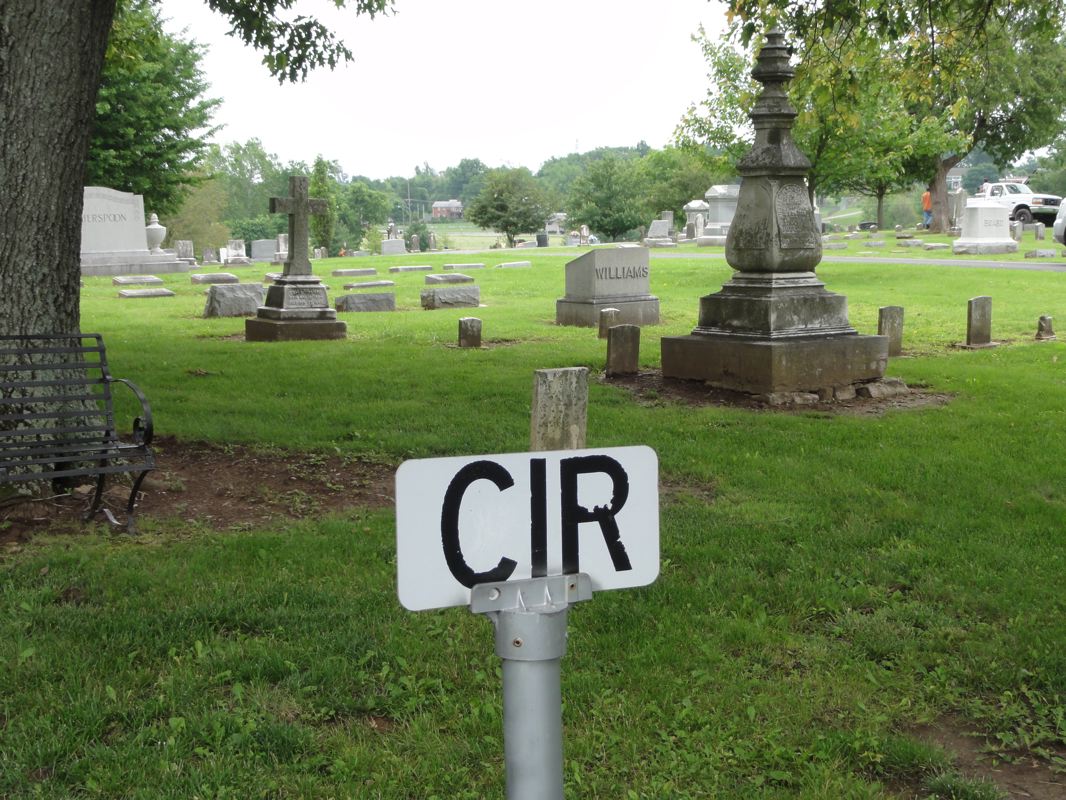
Section CIR - Location of the Williams Plot

Looking toward entrance of cemetery from grave of J.A. Williams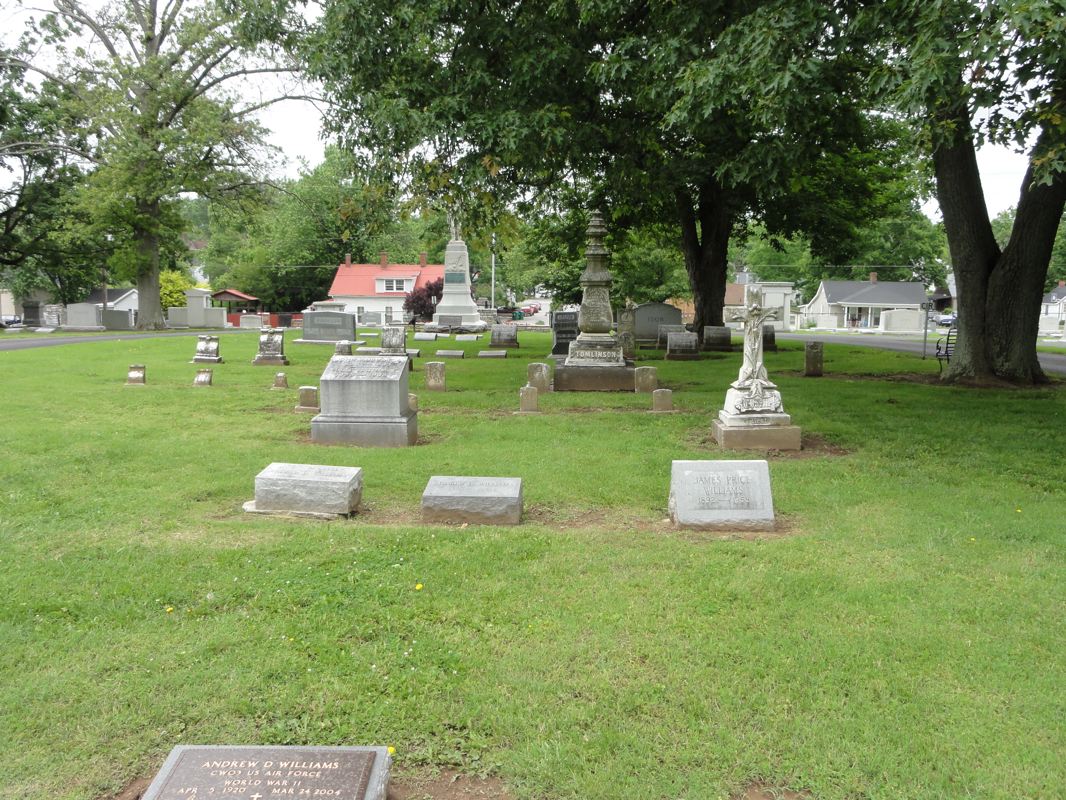
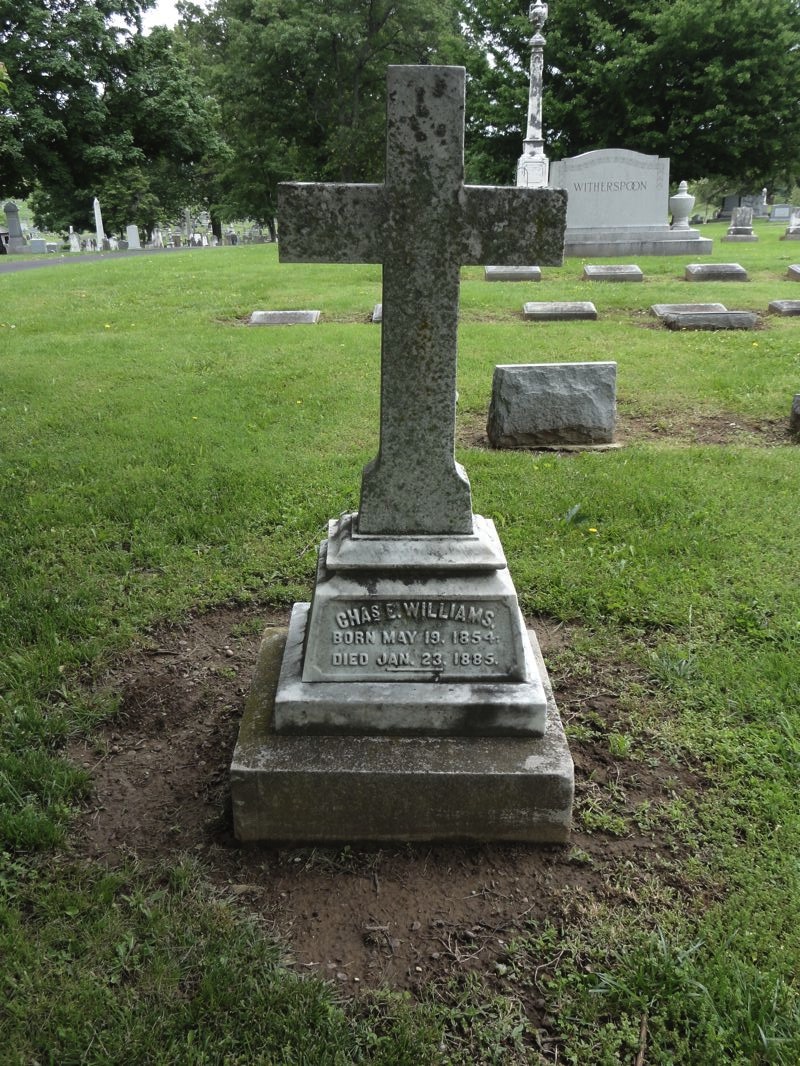
Charles E. Williams
Born May 19, 1854
Died January 23, 1885

James Price Williams
1892-1958
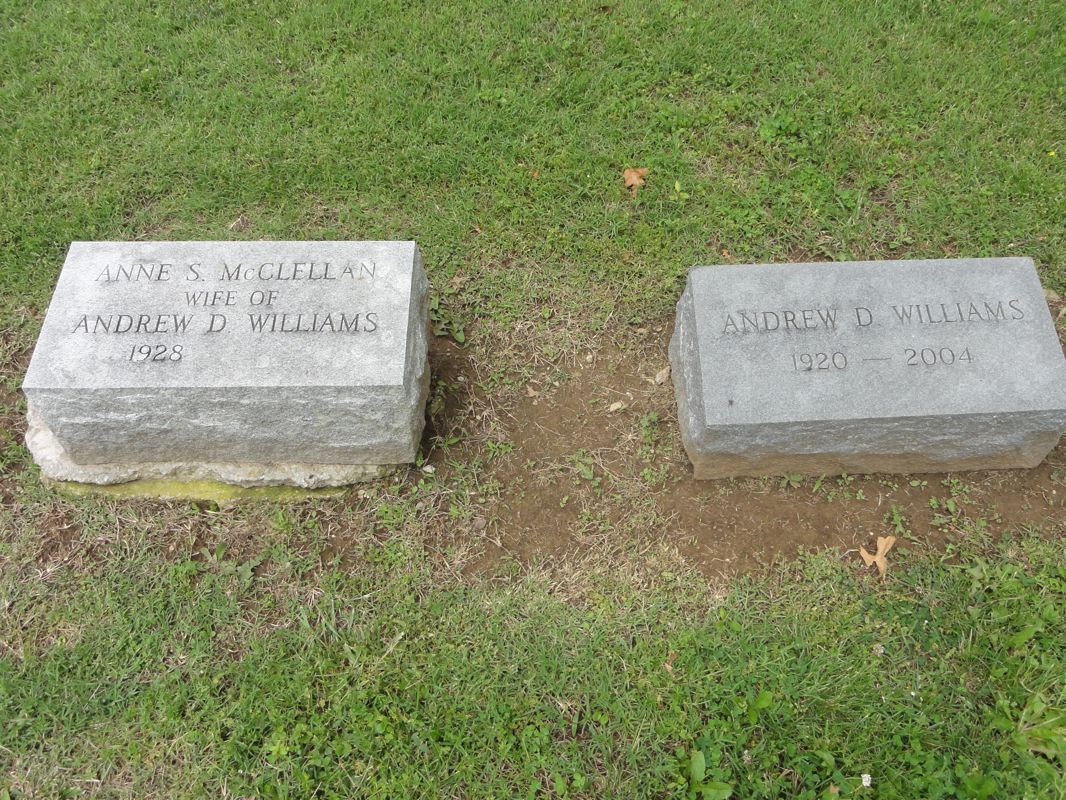
Anne S. McClellan, wife of Andrew D. Williams 1928 -
Andrew D. Williams 1920-2004

John Augustus
1824-1903
Mary Hathaway
1825-1902
![]()
Photos Taken May, 2011
Courtesy of Scott Harp
www.TheRestorationMovement.com
Special Thanks: In May, 2011, your web editor traveled with C. Wayne Kilpatrick and Tom L. Childers into Kentucky for a research trip. Harrodsburg was visited the last day of a very busy and tiring week. Thanks to these fellows for assisting and taking many of the pictures you see on this page.
![]()
